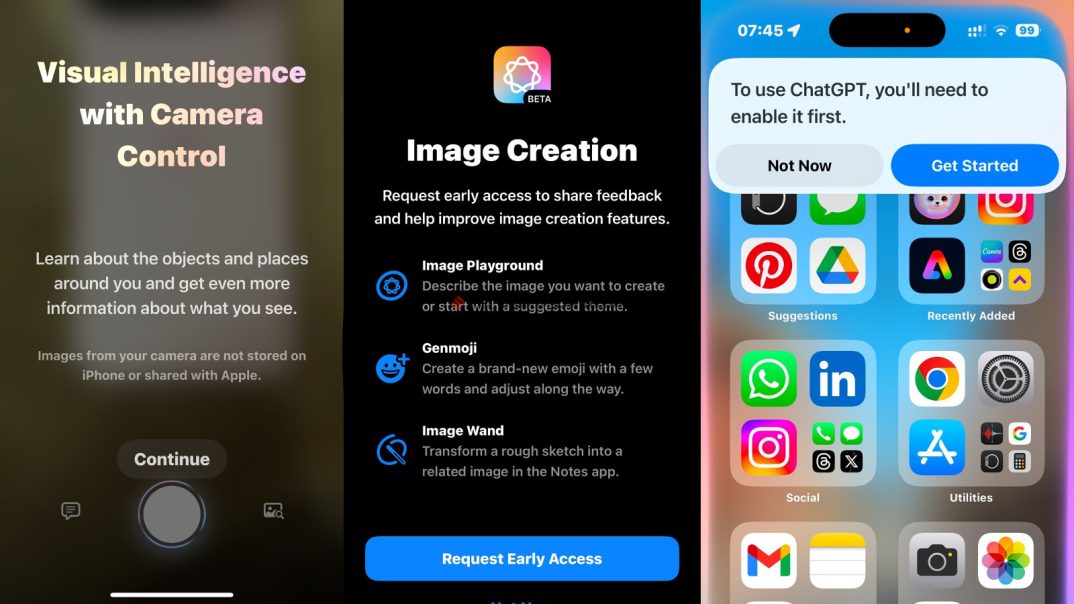Apple rolled out a beta version of its software on Thursday, featuring new Apple Intelligence capabilities, including the much-talked-about ChatGPT integration. However, this is a developer preview and is still far from being released to the public. Apple Intelligence has been in previews for months, and the company is expected to release the first wave of Apple Intelligence features to the public as early as next week as part of iOS 18.1.
The preview offers an early build of the new generative artificial intelligence features that Apple revealed at its annual developer conference earlier this year. These include Genmoji, Image Playground, Visual Intelligence with Camera Control, and integration with OpenAI’s ChatGPT. Genmoji and Image Playground allow users to generate images on-device to send to friends in Messages.
Perhaps the most anticipated feature of Apple Intelligence is the deep integration with ChatGPT. When you ask Siri a complex question, your device will prompt you with the option to “Use ChatGPT?”—which you can either accept or decline. If you accept, your query will be processed through the generative AI service, and the response will be displayed natively on your device. Access will be free for all users, though paid ChatGPT subscribers can connect their accounts to Apple products for additional benefits. ChatGPT will also be integrated into writing and image-generation features, as well as powering a new feature called Visual Intelligence, where the phone’s camera can identify text or objects and even translate signs in real-time.
Apple’s first wave of Apple Intelligence, the company’s homegrown AI products integrated throughout its operating systems, may seem underwhelming at first. However, the company has an advantage over others: the ability to roll out features to a massive base of devices. When Apple announced its AI features in June, the software was only compatible with two iPhone models, a couple of iPads, and Macs with its in-house silicon. Now, its newest iPhone 16 models, all iPads—including the newly launched iPad mini—and Macs support Apple Intelligence. Apple is expected to announce new M4-Macs soon, which will also support Apple Intelligence, with the new processors likely to speed up AI tasks even further.
With the new Apple Intelligence technology baked into the latest versions of iOS, iPadOS, and macOS, Apple gains an advantage over rivals like Google and Samsung. While those companies may have had a head start in rolling out new AI features, their hardware, software, and services aren’t as seamlessly integrated as Apple’s.

So far, Apple has successfully convinced investors that it’s competitive in the race for Artificial Intelligence, and Wall Street has rewarded the world’s most valuable tech company accordingly. However, Apple has yet to prove it can achieve true expertise in AI, with some experts suggesting the tech giant is about two years behind its competitors. The real test will come when Apple rolls out the first wave of Apple Intelligence features—such as rewriting text to make it sound friendlier or more professional, or recording meetings and phone calls, then using Apple Intelligence to transcribe and summarize what was said.
The rollout of the first wave of Apple Intelligence next week will be a test for Apple to see if consumers are as interested in AI features as the industry has anticipated. Experts point out that Apple Intelligence may not directly lead to increased iPhone sales, the company’s most lucrative product, which generates billions of dollars a year. Some blame Apple for delaying the release of Apple Intelligence features on the new iPhone 16 models, which has impacted the sales of these devices. Apple shares fell about 2 per cent on Wednesday after industry supply chain analyst Ming-Chi Kuo reported that the company has cut orders for the iPhone 16 by about 10 million units for the fourth quarter of this year and the first half of 2025. Kuo now forecasts that Apple partners will produce 80 million iPhones during the fourth quarter, down from around 84 million last year.





